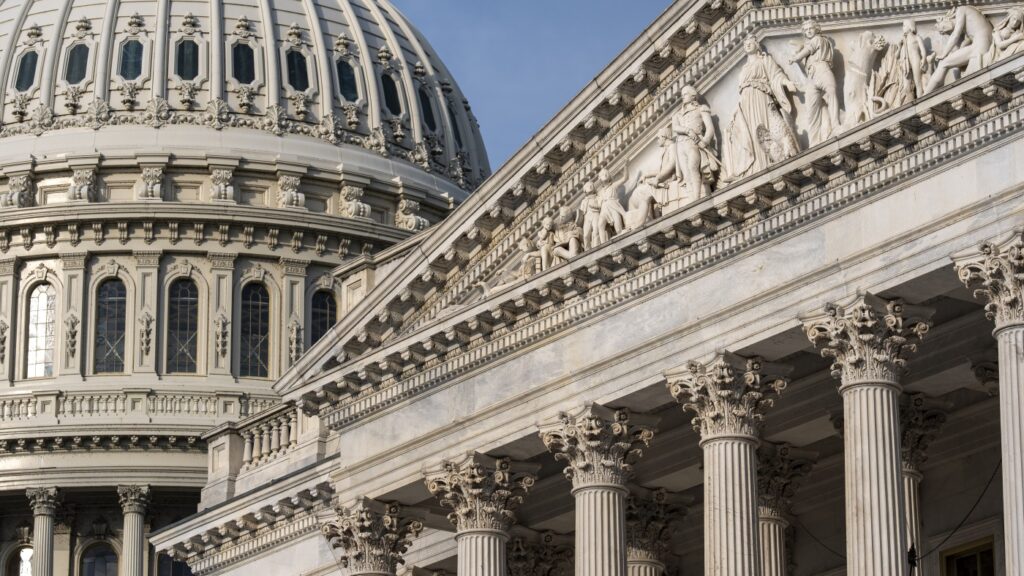
The Senate side of the Capitol is seen in Washington, early Monday, June 30, 2025, as Republicans plan to begin a final push to advance President Donald Trump's big tax breaks and spending cuts package. (AP Photo/J. Scott Applewhite)
In a pivotal moment for U.S. fiscal policy, Senate Republicans have successfully passed President Trump’s sweeping domestic policy bill. The legislation, which proposes significant tax cuts while reducing spending on key social programs, now awaits a decisive vote in the House of Representatives. The bill passed with a narrow 51-50 vote, with Vice President JD Vance casting the tie-breaking vote. Notably, three Republican senators—Susan Collins of Maine, Thom Tillis of North Carolina, and Rand Paul of Kentucky—voted against the bill, highlighting internal party divisions.
The bill’s passage marks the culmination of intense negotiations among Senate Republicans, balancing demands from fiscal conservatives for deeper spending cuts with concerns over the potential nationwide impact of such reductions. The legislation aims to extend the 2017 tax cuts, preventing a potential rate hike at the year’s end, while offsetting costs through cuts to the Supplemental Nutrition Assistance Program (SNAP) and significant changes to Medicaid. Early estimates suggest that these changes could result in approximately 11 million Americans losing healthcare coverage.
Contentious Negotiations and Party Dynamics
The Senate vote follows weeks of contentious negotiations, with fiscal hawks advocating for more aggressive spending cuts. Meanwhile, some Republicans expressed concerns about the bill’s potential impact on vulnerable populations. The bill’s passage underscores President Trump’s influence in unifying the GOP’s disparate factions.
Senate Majority Leader John Thune, R-S.D., emphasized the bill’s alignment with the GOP’s electoral mandate, stating, “With this legislation, we’re fulfilling the mandate we were entrusted with last November and setting our country and the American people up to be safer, stronger, and more prosperous.”
“With this legislation, we’re fulfilling the mandate we were entrusted with last November and setting our country and the American people up to be safer, stronger, and more prosperous.” – Senate Majority Leader John Thune
Challenges Ahead in the House
Despite the Senate’s approval, the bill faces significant hurdles in the House, where GOP lawmakers have already signaled major objections. The use of the reconciliation process allowed Senate Republicans to bypass a Democratic filibuster, passing the bill with a simple majority. However, this process also required the bill to adhere strictly to budget-related elements, resulting in the removal of several GOP priorities.
House Speaker Mike Johnson, R-La., faces a critical test in navigating the bill through the House without further amendments. Johnson, who previously secured the bill’s passage by a single vote, has urged the Senate to minimize changes. “The American people gave us a clear mandate, and after four years of Democrat failure, we intend to deliver without delay,” Johnson stated.
Implications for Social Programs and Economic Policy
The Senate bill mirrors the House version in many respects, including its emphasis on extending tax cuts and increasing funding for military and immigration enforcement. However, the two chambers differ on funding methods, with the Senate’s changes facing resistance from some House Republicans.
Medicaid is a significant target for savings, with the Senate plan expanding work requirements to parents of older children. Additionally, the Senate has proposed changes to provider taxes, which states use to secure federal Medicaid funds. To address concerns about rural healthcare, the Senate included a $50 billion fund to support rural hospitals starting in 2026.
“I strongly support extending the tax relief for families and small businesses. My vote against this bill stems primarily from the harmful impact it will have on Medicaid, affecting low-income families and rural health care providers like our hospitals and nursing homes.” – Senator Susan Collins
Senator Susan Collins expressed her opposition to the bill, citing its adverse effects on Medicaid and rural healthcare providers. Similarly, Senator Rand Paul opposed the bill due to a provision raising the nation’s borrowing authority by $5 trillion.
Economic and Political Ramifications
The bill’s expansive scope, nearly 1,000 pages long, includes provisions affecting various policy areas. It proposes cuts to SNAP and clean energy credits, while committing billions to border security and overhauling the federal student loan program. The bill also proposes ending the $7,500 electric car credit established under President Biden’s Inflation Reduction Act.
Another contentious issue is the debt ceiling increase. The Senate’s $5 trillion proposal exceeds the House’s $4 trillion figure, raising concerns among fiscal conservatives. Treasury Secretary Scott Bessent has warned of a potential debt default as early as August without congressional action.
The nonpartisan Congressional Budget Office estimates that the Senate bill would add over $3 trillion to the deficit over the next decade.
The Congressional Budget Office projects that the Senate bill will significantly increase the deficit, primarily due to the extension of the 2017 tax cuts. The bill also modifies the state and local tax deduction, a key issue for GOP lawmakers from high-tax states.
As the House prepares to vote, the bill’s future remains uncertain. The outcome will not only determine the fate of President Trump’s tax policy but also shape the broader economic landscape and social safety net in the United States.





